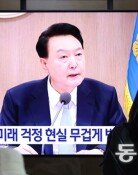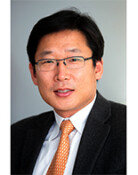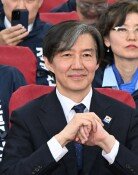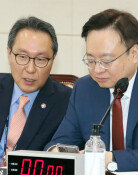Spreading rumors during a security crisis is an act to benefit the enemy
Spreading rumors during a security crisis is an act to benefit the enemy
Posted August. 24, 2015 07:41,
On Aug. 22 when the military tension was heightened between the two Koreas, fireworks set off during a festival in Gimpo, Gyeonggi Province, caused a disturbance. Surprised by the sound, local residents mistook it for the sound of shooting from North Korea and called the city office and police stations to confirm what the sound was. Gimpo is in the border line area, which is only 10 kilometers away from the Military Demarcation Line. Although the high-level talks were held between the North and the South at that time, tensions were growing in the front lines. It was a festival organized by a community service center and a local autonomous committee that showed the fireworks. Gimpo City must have stopped the festival hosts from setting off fireworks. Another fireworks set off after an outdoor concert in Siheung, Gyeonggi Province, drew criticism and questions. If autonomous community organizations lack a sense of discernment as evidenced from these two occasions, how can the organizations protect and take care of local residents during a crisis?
A man in his twenties was arrested for sending a fake text message from the Ministry of Defense to summon reservists. Just for fun. I wanted to make people nervous. His excuse sounds insane. Falsehoods were posted on the Internet, such as North Korea denies responsibilities (for the landmine blast). I rationally trust them more than South Korea led by a low-quality government and It is made up by the ruling Saenuri Party under the directions of the U.S. who is behind the scene. North Korea uploaded a video showing people at the Incheon International Airport and supermarkets of South Korea and mislead viewers that South Koreans are going out of the nation and hoarding basic necessities.
At the center of Seoul, members of the Corean Alliance for Independent Reunification and Democracy staged an unscheduled protest calling for suspension of Ulchi Freedom Guardian joint war exercises and the anti-Pyongyang broadcasts. This is an act to benefit the enemy at this critical moment. Their demands are identical to those of North Korea. The Corean Alliance follows the strategy of South Korea revolution pursued by Pyongyang and calls for withdrawal of the U.S. armed forces in Korea, establishment of an independent democratic government, and realization of federal unification. The alliance is classified by the South Korean prosecution as a group that benefits the enemy. The Republic of Korea cannot exercise unlimited tolerance toward those who want to deny and destroy the freedom and democracy system.
However, most of South Koreans spent the day as peaceful as usual, even though they couldnt shake off anxiety and concern over a possible military conflict. It was like any weekend day where families, friends and couples went out to main streets or to the outside. People enjoyed summer vacations at beaches across the nation as they did in other weekends. There was no long queue for panic buying that took place during the Yeonpyeong battle with North Korea in November 2010. Citizens showed a mature attitude based on the trust in the government and the military.
National security is not protected by the military or the police alone. When backed by unity and support of the public, the national security is strengthened. It is promising to see that the politics, regardless of the ruling and the opposition, was united as one group against North Koreas threat.
Headline News
- Israel prepares for retaliation against Iran
- Samsung reclaims top spot, surpassing Apple in smartphone market
- 77% of Koreans in 20s and 30s are 'Kangaroo Tribe' due to job crisis
- KBO referees embroiled in controversy over ABS decision concealment
- Inflation, oil price surge put double shock on global economy







